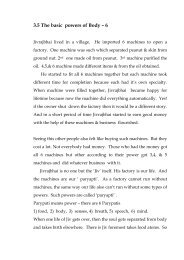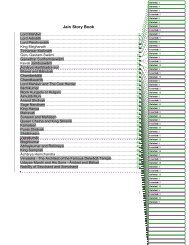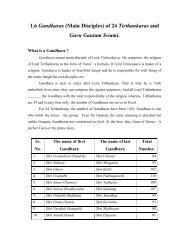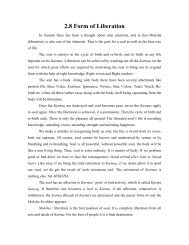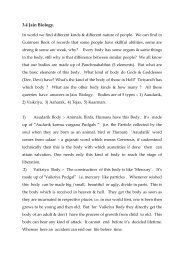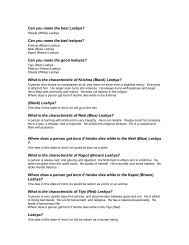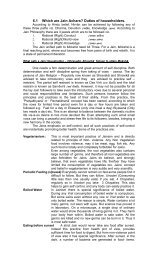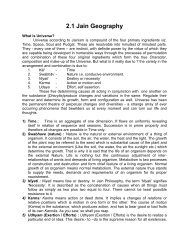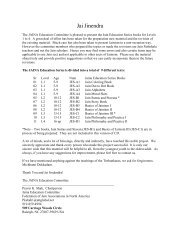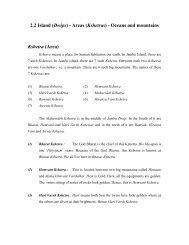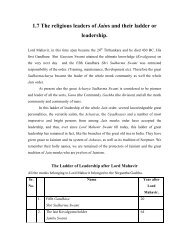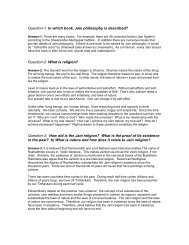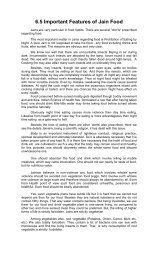Paryushan Parva - Jainism, Jain Religion - colleges
Paryushan Parva - Jainism, Jain Religion - colleges
Paryushan Parva - Jainism, Jain Religion - colleges
You also want an ePaper? Increase the reach of your titles
YUMPU automatically turns print PDFs into web optimized ePapers that Google loves.
Pratikraman in English with Meaning<br />
Going Back to the Path of Purification<br />
"O Lord! What good does aloyanä 1 i.e. confession or reflection do to the<br />
soul?" Asked the Chief Ganadhar Shri Gautam Swämi to Lord Shri<br />
Mahävir Swämi.<br />
Lord Shri Mahävir Swämi replied to the Chief Ganadhar Shri Gautam<br />
Swämi, "O Gautama! The threefold internal darts (shalya), viz. Deceit,<br />
desire for worldly gains as the fruits of spiritual activities, and perversity,<br />
which create obstacle in the path of liberation or Moksha 2 , and lengthen<br />
the span of worldly existence 3 , are removed by such a confession or<br />
aloyanä. Sanity manifests soon after the removal of these internal darts.<br />
This sane soul becomes free from deceit, hatred, or attachments, and<br />
would not attract karma particles, which are responsible for the worldly<br />
existence. For the purification of the soul, it is essential that all<br />
liberation-seeking souls resort to reflection and confession, which roots<br />
out the internal darts and brings sanity."<br />
1 Also known as älochanä, one type of Präyaschhit (repentance for the breach of vows) . In präyaschhit, one asks for<br />
forgiveness for the various errors of commission and omission, the faults and the sins committed knowingly or<br />
unknowingly. This austerity may be performed in the presence of a <strong>Jain</strong> ascetic or can be done alone. Präyaschhit helps<br />
us to reflect upon ourselves in a way that leads to self correction. Even for a small fault we should say " Michchha Mi<br />
Dukkadam." There are nine subtypes of präyaschhit. (1) To confess one's mistake in the presence of the preceptor and<br />
with a pure heart - that is called älochanä. (2) To repent for the mistake that has been committed and to refrain from it,<br />
as also to remain alert that no new mistakes are committed - that is called pratikramana. (3) When these älochana and<br />
pratikramana are performed together - that is called a combination of älochana and pratikramana. (4) When prohibited<br />
food and drink happen to have been received and the fact comes to light later on, then to discard these food and drink -<br />
that is called viveka. (5) To regret the mistake committed, one adopts an attitude of concentration to give up the<br />
operations of body and speech - that is called vyutsharga. (6) To regret the mistake committed, one performs external<br />
penances like anashana etc. - that is called tapas. (7) Corresponding to the gravity of the offense committed, the<br />
reckoned period of monkshood is reduced by a day, a fortnight, a month or a year - that is called chheda. (8) To keep an<br />
offender at a distance from oneself and not to have with him engaged any dealings of any sort for a fortnight, a month or<br />
the like as might suit the gravity of his offense - that is called parihära. (9) When on account of a violation of the earlier<br />
accepted mahävratas (major vows) - non-violence, truthfulness, continence etc. - they are forfeited - that is called<br />
upasthäpanä.<br />
2 Moksha = moha + kshaya; moha means delusion and kshaya means eradication - this makes Moksha as the state where<br />
there is no delusion and all karma are eradicated. There are three jewels, samyak-darsana or right perception<br />
(inclination or belief), samyak-jnäna or right knowledge (cognition), samyak-chäritra or right conduct - these three<br />
combined are the means of Moksha.<br />
3 Material world (the cycle of transmigration – samsära) involves cycles of birth, aging and death, and misery and no<br />
permanent happiness<br />
3




